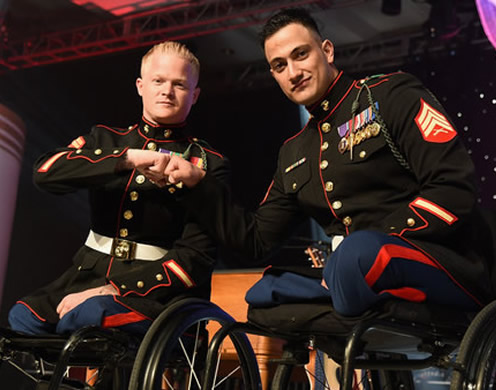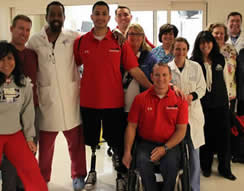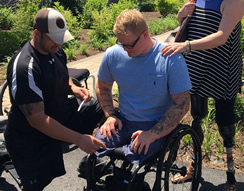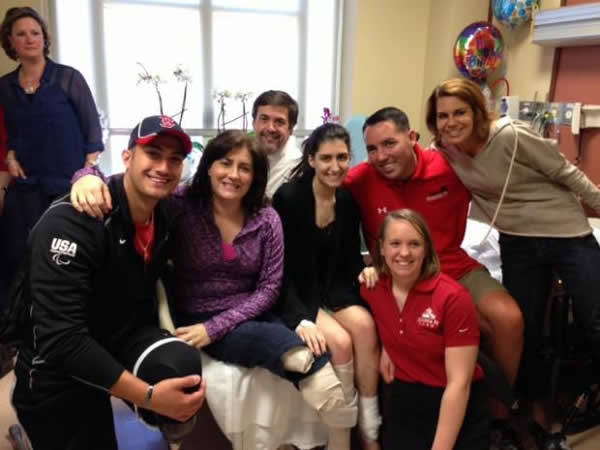Archived Content
In an effort to keep ICE.gov current, the archive contains content from a previous administration or is otherwise outdated. This information is archived and not reflective of current practice.
HEROs provide support to Boston Marathon bombing victims
When the bombs went off near the finish line of the Boston Marathon in April 2013, thousands of miles away in Denver, Colorado, Gabe Martinez knew immediately that the lives of those injured would never be the same.
He also knew that for those who suffered life-changing injuries, life would indeed go on.
Martinez is a living testament. On Thanksgiving Day 2010, while serving in the U.S. Marine Corps in Afghanistan, a bomb exploded. After spending 22 years with his natural born legs, he lost both in a split second.
As Martinez watched the news, his wife Kayla reminded him of when he had just lost his legs. She remembered how meaningful it was for him to see another amputee walking on their prosthetics and living life.
“She reminded me of how big that was for me,” he said.
Looking to find a way to visit the victims, Martinez, a Human Exploitation Rescue Operative (HERO) and computer forensic analyst (CFA) with U.S. Immigration and Customs Enforcement’s (ICE) Homeland Security Investigations (HSI) Denver, reached out to Karen Guenther, founder, president and CEO of the Semper Fi Fund, an organization created by a group of Marine Corps spouses in early 2004 with the aim of providing immediate financial assistance and lifetime support to post-9/11 wounded, critically ill and injured members of all branches of the U.S. Armed Forces, and their families.
“I asked her was there any way she could get me and some other wounded warriors out to Boston to start visiting some folks,” Martinez said. “After a few days, three other injured veterans and I were on the way to Boston.”
When they arrived, the first responders were still on duty. The group met with the head surgeon at Massachusetts General Hospital who gave them an update on the status of the injured survivors. Martinez and the group then went throughout the hospital visiting the injured patients and providing encouragement.
Following the success of the first trip, Martinez returned two weeks later. In the first year following the attack, he went to Boston 12 times. He recently returned to Colorado from his most recent trip.
The original intent was to do one trip, meet with the injured survivors and let them know that everything is going to be OK and be done; however, it has evolved into an annual reunion where lifelong relationships have been formed. One of the closest connections Martinez has made is with the family of Celeste and Sydney Corcoran, a mother and daughter who were wounded in the bombing. Celeste suffered the same injury in the bombing as Martinez did in Afghanistan. The bond has evolved over the years to where the Corcoran’s have been there for the birth of two of Martinez’s children, and he and his wife Kayla stay with them when they travel to Boston.
“I didn’t know it was going to turn into a lifetime thing. These people who were once strangers to me are now family,” Martinez said. “A lot of them deal with a lot of the same things that we in the military dealt with.”
Over the years, Martinez has invited friends to make the trip with him. One of those friends is HSI Tampa CFA and fellow HERO Justin Gaertner, who was injured in the same attack in Afghanistan as Martinez.
According to Gaertner, who was also at the most recent reunion, it’s nice to see where the survivors are now versus where they were immediately after the bombing. Coming to grips with life after the injuries remains, yet the conversations have changed with time. In the beginning there were a lot of questions about rehab and adaptability. It has since evolved into the residual effects of living with a lifelong handicap.
Just as Martinez and Gaertner have made it a mission to let those who were injured in the Boston Bombing know that the events of the day weren’t the end for them, they too had to learn that lesson. Not only did friends and family help both, but the opportunity to join ICE through the HERO program.
The HERO program was created to provide wounded, injured and ill Special Operations Forces an opportunity to receive training in high-tech computer forensics and law enforcement skills, to assist federal agents in the fight against online child sexual exploitation.
“It gave me a second chance to serve my country. Without this program, I don’t know where I would be in life right now,” Gaertner said. “I fought hard to get back overseas with my platoon and once that wasn’t happening, I was able to find a way to keep serving my country.”
Added Martinez: “It’s been a life saver for me. Many of us went from having a mission every day, to nothing. The HERO program pulls guys like me out of the hole and gives us a new mission and the chance to wake up every day and serve.”






